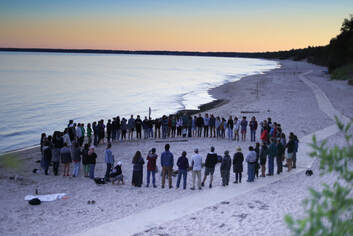Our StoryYouth Initiative is about building the students’ character, their ability to think, feel and act with love and purpose.
We do this within the context of a community, where people depend on each other and collaborate for the good of the whole. We see adolescence as a transition from outwardly imposed authority to inner authority, as a process of developing autonomy. We facilitate individual student talents and personal growth, their imagination and passion and their love of the arts. Our rich challenging course of study integrates academics, the arts, and practical life skills. Students are asked to take on meaningful responsibility, to help in directing the course, and, in so doing, to step into their emerging selves. You can see this in our Curriculum and our Community. Youth Initiative is a place unlike any other high school you’ve ever been to. It’s a place where teenagers actually love being here. There’s a palpable joy you experience when you walk through the hallways. When you talk to the teachers: these are people who are just really alive, they’re excited to be teaching their classes, they have a real say in running the school. Everyone has a hand in running the school. I think that’s what gives it this living feeling: that everyone’s voice really matters. There is a circle of support for every single student at YIHS. A strong foundation baked and tempered in love, hard work, understanding and patience. Teachers and parents combine many lifetimes of acquired skills, and most of all devotion to the young lives before us. What an inspiration they are…. and what a great pool of expansive learning these students come into. The students in turn support one another. One can only observe this and think: this is what the world needs. This is the most impressive example of an education that works I have ever seen. Youth Initiative is constantly evolving while holding true to its guiding principles.
Committees of the school have clear mandates to fulfill the long and short term goals of the school and the Board is responsible for making sure all bodies of the school are in alignment with our mission. A strategic planning committee meets regularly to update our long-range plan and to help facilitate awareness and communication of developments across the school. A Short History of YIHS
The Youth Initiative High School was founded in September, 1996 through the collaborated efforts of a dedicated group of students, parents, teachers, and community members. Although the idea of a Waldorf or Waldorf-inspired high school for the Viroqua area had been discussed among members of the Pleasant Ridge Waldorf School community for a number of years, the most urgent call that led to the creation of a new school at that time arose from a small group of students attending local public and parochial high schools. They shared a desire for a school that would be academically challenging, respectful of individual freedom and dignity, and rooted in a meaningful sense of community and shared responsibility.What began as conversations among friends in school cafeterias, at parties, and over the phone, soon grew to include parents and other members of the adult community. There, the dissatisfied students found a surprisingly supportive and encouraging attitude. Many members of the adult community had been personally involved with starting new independent organizations, including local food coops, the Coulee Region Organic Produce Pool (CROPP-Organic Valley), Pleasant Ridge Waldorf School, and many private businesses. Thus, the students’ proposal for a new school was very favorably received by a community for whom initiative, entrepreneurship, and innovative social organization were all familiar and highly valued. The first class at the still unnamed Youth Initiative High School began in September, 1996 in one room on the second floor of the Landmark Center. The first Youth Initiative class was in a sense a throwback to the one-room school. There were eleven students – 10 male and 1 female-from grades nine through twelve, all in one classroom. The Faculty who stepped forward to take part in the creation of the new school were a richly talented and diverse group, bringing to light a surprising well of experience for a small rural community. Academically, much of the focus of that first year was on the creation of a Mission and Vision statement and other founding documents for the school, in which the students and school community were led by Jerome McGeorge. In May of 1997, YIHS produced its first drama performance – a musical version of the Medieval morality play Everyman – and graduated its first three seniors. Over the course of the next several years the school grew slowly, engaging in the difficult work of establishing traditions, organizational forms, and a strong culture of cooperation and shared responsibility in the school. One aspect of YIHS which has remained constant has been the central role of students in the governance and funding of the school. In its first year, YIHS students raised over 1/3 of the school’s budget through concerts, agricultural work, and the renovation of a stained glass window for St. Joesph’s Ridge Catholic Church, which became the emblem of the school. In later years, students operated a landscape mulch business and a main lesson book bindery, grew organic produce, picked stones for local farmers, held elegant dinners, and engaged in numerous other fundraising activities. Meanwhile, students also cleaned the school building and played an active role in the governance of the school on the Board of Directors and on a variety of other school committees. Enrollment at YIHS grew steadily over the first four years. From the initial eleven students in 1996, the school reached of 32 students at the beginning of the 1999 school year. During the 1999-2000 school year, however, the school experienced a significant and multi-faceted crisis of identity which resulted in the loss of a number of students, knocking the school back to an enrollment of 21 students in September of 2000. A key result of this period was a thorough revision of the school’s “Vision and Purpose Statement,” which came to place much greater emphasis on responsibility, self-discipline, and respect for the school community and recommitted the school to working within the Waldorf model. In order to support this vision of the school, a committee of students, parents, and teachers developed the Care Group Process, partly on the basis of the character education curriculum of the Hyde School in Connecticut. By September of 2002, YIHS had fully recovered from the earlier setback to enrollment and to its reputation in the local community. Enrollment that fall stood at 32 students, including a relatively large class of freshman students directly out of Pleasant Ridge. From that point, the school has grown rapidly, reaching 50 students in the Spring of 2005. Student enrollment has held steady ever since. For the academic year of 2013-14 YIHS enrolls 50 students. In its first 17 years the school has produced over 120 graduates, of whom over two-thirds have gone on to attend college or university. Another dimension of the school’s growth can be seen in the development of its administration. In the second year, math teacher Arthur Bernstein was hired as a full-time coordinator and two part time coordinators were added in subsequent years. This staff was succeeded in 2000 by German teacher Conrad Rehbach and, in 2004, Jacob Hundt, one of the founding YIHS students, was hired as a second full time employee, with a mixture of teaching and administrative responsibilities. Finally, in 2005, Liz Cox became the school’s first development officer, first as a parent volunteer and soon after as a part-time employee. After a health condition forced Mr. Rehbach to retire in 2007 the school was once again forced to reevaluate its leadership structure. The school responded by strengthening its policies looking to ground itself in constitutionalism instead of personality. Over the next couple of years YIHS created or formalized policies regarding personnel decisions, curriculum requirements, and many more as the institution matured into its second decade. In addition, YIHS underwent an administrative reshuffling in 2008. Liz Cox became the school’s administrator, Jacob Hundt its Program Director and Faculty Chair and two new full-time staff members were hired, Shawn Lavoie and Matthew Voz, both with teaching and development office responsibilities. In 2012 the administrative core shuffled again. Shawn Lavoie left for a year-long Masters Program at Harvard Graduate School of Education and Dave Hibbard-Rode was hired on as the new Development Assistant. Liz Cox, long-time administrator, parent and supporter of the school, left at the end of 2011-12. So at the start of the 2012-13 school year, Matt Voz took over the administrator role, Jacob Hundt remained the Program Director, Shawn Lavoie returned as Development Director, and Dave Hibbard-Rode took on more Development and teaching tasks. Increased maturity as an organization has given us the stability needed to construct and follow our dreams. YIHS in 2011 published its Long Range Plan and we are actively working on making it a reality. As YIHS passes its 20th year it continues to be a vibrant school, full of energy and exploration. We continue to grow, to be open to change and evolution and we look forward to the years ahead. Writings About Our School
“An Ode to Youth Initiative High School” – Sheila Sherwin “Alternative Education and Civil Society in Viroqua, Wisconsin” – Jacob Hundt Syzygy: Debating Structure and Antistructure in an “Egalitarian” High School – Julia Steege “Success and Sustainability of Visionary Grassroots Education Initiatives in Rural Areas” – Vicky Eiben “Education to Cultivate the Capabilities of Our Youth” – Matilda Kriemelmeyer “Schools as Sites of Social Change: Notes on the Youth Initiative High School” – Shawn Michael Lavoie Speech given at the “Education Revolution” conference in 2004 – Silas Hundt |
"Our highest endeavor must be to develop free human beings who are able of themselves to impart purpose and direction to their lives." "Only a virtuous people may be free." "The responsibility for tolerance lies with those who have the broader vision." |
Copyright © 2023 Youth Initiative High School | 500 E. Jefferson St, Viroqua WI 54665 | (608) 637-6445


